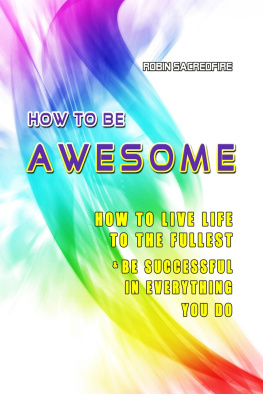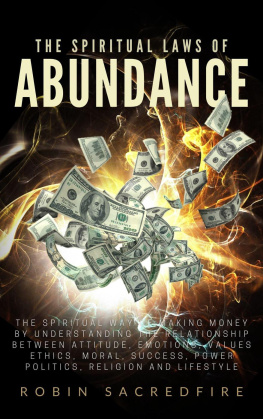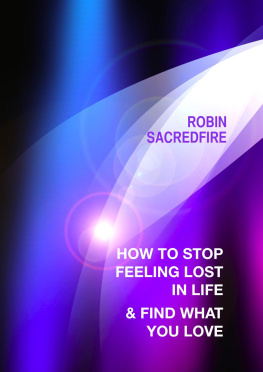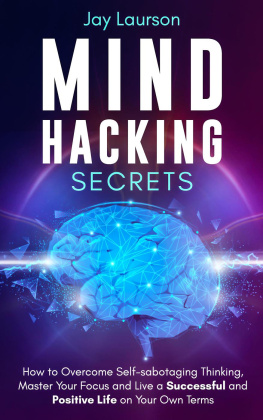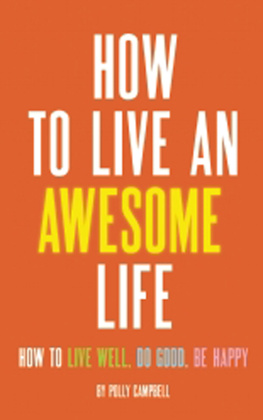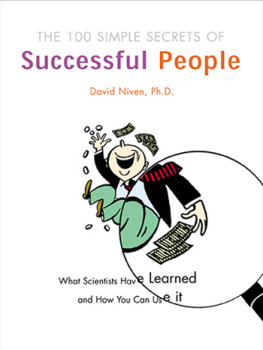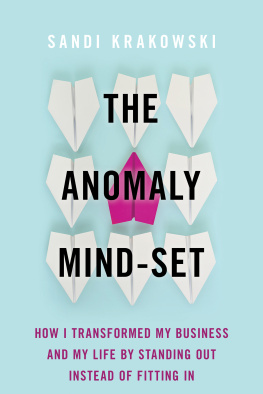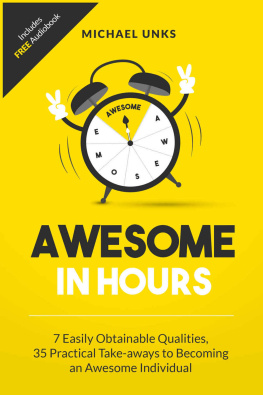How to Be Awesome: How to Live Life to the Fullest and Be Successful in Everything You Do
Robin Sacredfire
Published by 22 Lions, 2015.
How to Be Awesome: How to Live Life to the Fullest and Be Successful in Everything You Do
By Robin Sacredfire
Copyright Robin Sacredfire, 2014 (1st Ed.) All Rights Reserved.
Published by 22 Lions
Draft 2 Digital Edition
Introduction
M ost people have no idea about what they should be doing in life, what kind of life purpose they should be following and, much less, their inner and undiscovered talents and qualities.
The potential to be famous and successful is the same for everyone. But we all have problems in the same proportion of our ambitions and dreams.
Life presents itself in such a way because there's a relation between what we think, what we believe, what we suffer the most with, what we love to do and what we feel about ourselves.
Knowing the connection among all these elements and how they interact is what has made people seem awesome.
Anyone can be awesome, live life to the fullest and be successful, but the secrets have been very well-hidden from society and even scientists.
Here, these secrets are revealed with an honest approach based on real life examples that anyone can follow to rediscover a new personality and transform the future in a completely new direction, with more hope and confidence.
What is offered is, in truth, the path to a new you.
The secret law that Freud couldn't see
W hen Freud said that "Men have gained control over the forces of nature to such an extent that with their help they would have no difficulty in exterminating one another to the last man" (in The Future of an Illusion, Freud 1927), he claimed that humans are self-destructive by nature.
This is not true. Even though humans tend to be negative, this is not their real nature.
Freud also said that humans are born with a pulsation for aggression and self-gratification.
In his book, Civlilization and its Discontents (1927), he said that "men are so little accessible to reasonable arguments and are so entirely governed by their instinctual wishes" that the "natural instinct of aggressiveness in man, the hostility of each one against all and of all against each one, opposes this programme of civilization" (In Beyond the Pleasure Principle, 1920), because the "masses are lazy and unintelligent, they have love for instinctual renunciation" (Civilization and its Discontents, 1927).
Freud was talking about a predominant tendency, but it can be changed.
This behavior arises more strongly from the suppression of other higher abilities, like love and creativity.
Freud was working for secret societies with particular interests in differentiating themselves from the masses to justify their predominance over them, just like Pavlov, and their theories matched perfectly to strengthen the industrialized mindset that humans are just animals and need to be controlled by an hierarchical system of orders and rules.
Most of his researches were false but its very difficult to prove it nowadays. His theories are now mainstream beliefs in psychology and psychiatry
The truth, however, is that our nature can be seen as something good or bad, depending on the perspective assumed.
On the other hand, we surely cant develop within multiple contradicted personalities at the same time. So, for example, I found that creativity operates in a very high frequency and high frequencies are fast. Therefore, everything that forces an artist to slow down actually makes him feel and act as if he was stupid, dominated by his instincts.
Many examples of successful artists show that they were horrible students, because sitting in a chair for a whole day is an habit against who they are. And the same applies for children being labeled with attention deficit hyperactive disorder
We can also see this principle in the opposite direction, as when we provide someone with the chance to develop within his own frequency.
Dozens of researches that I have personally conducted with children from poor environments and social backgrounds, has proven me that, if respected within their own limitations, they can actually perform better than all the others.
This children need more love from adults, as they don't have it at home, they need to learn with toys, because they don't have enough at home to stimulate their intellect, and they need an adult that can talk to them with respect, which is something they also don't have.
When these 3 variables are properly put in place, the results are extremely high and fast to achieve.
Experience has also shown me that only teachers and psychologists can destroy the future of these children, the first because they support themselves in stereotypes, like the belief that intelligence is something to be evaluated, perpetuating unchangeable in time, and the second because they believe in the hierarchical principle of Freud that humans are just animals without the ability for reasoning.
As a matter of fact, if given the chance, children from the most idiotic parents can show a level of wisdom much superior to their own teachers.
This wisdom arises from the correct channeling and interrelation of pleasure and instinct, namely, through personal interests and habits, which Freud claimed to be something to suppress.
Few people in my life have understood how my success rate with children that had learning disabilities could be 100%, because they have focused in trying to control them.
The right attitude to make a child succeed is in fact the opposite. We must observe their nature, accept it and respect it.
Only afterwords can we think about a way to teach them, as every child learns in a differentiated model.
In my personal life, for example, I can only write books outside my house, in the terrace of a coffee shop in a warm country, with the sun directly hitting my head and face, despite the fact that I can barely see the words in my laptop; I can only create music when I feel happy with life; and, I can only read a book in a park, surrounded by trees and birds.
This is who I am. So, to say that I'm stupid just because I can't pay attention in a classroom, read inside the house and in silence, or because I have lower grades in exams is unjust. But, this was the dominating attitude of everyone around me during all my entire life, until I solved the problem by myself when I was just at teenager.
Freud was as unintelligent as those he described in such way, because he couldn't see and understand what makes us all equal.
This equality comes not from our unanimity, but differences. It's our individuality that equalizes our potential.
In science, however, you can't obtain graphics and statistical conclusions from differentiations, and that's why academics can only be smart within their own brain with all its delusional assumptions.
Even the study of the brains of successful individuals have not provided any conclusions in science, because there's nothing there that science can reach to explain the successful mindset.
Success is within the reach of anyone, once we acknowledge this very well-hidden secret law.
The powerful law of human nature
I ts true that artists seem to perform badly in tasks in which they have to focus on others needs, or a long term task, or even those in which they must stay in the same place for a very long period of time.
In my case, for example, as a writer, painter and musician, I cant cook something that takes more than 5 min to finish, like rice, beans or pasta, but Im often good at cooking something very fast, like frying vegetables with meat in Chinese style, or making a juice.
I learned how to cook delicious Chinese food in one day, because it's meant for fast cooks, but years to properly learn how to cook something European.

